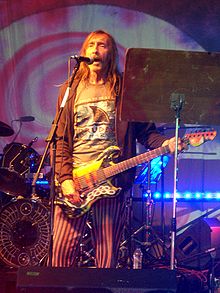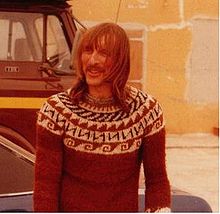- Dave Brock
-
For the Doors tribute singer, see Manzarek–Krieger.
Dave Brock 
Dave Brock at Skyfest 2009Background information Birth name David Anthony Brock Born 20 August 1941 Origin Isleworth, Middlesex, England Genres Space rock, Prog Rock Occupations Musician, Songwriter Instruments Vocals, Harmonica, Acoustic guitar, Electric Guitar, Synthesizer, Bass guitar Years active 1960–present Labels Flicknife, EBS, Voiceprint Associated acts Hawkwind David Anthony "Dave" Brock (born 20 August 1941 in Isleworth, Middlesex, England) is an English singer-songwriter and musician. He plays electric guitar, synthesizer, bass and oscillators. He is best known as being one of the founders and musical focus of the English space rock group Hawkwind. Brock is the only member of the group to have been a constant throughout the band's history .[1]
Contents
Early years
Brock's childhood was spent in Feltham, Middlesex attending the Longford Secondary Modern School (Now called Rivers Academy). It was his father's brother who introduced him to music giving him a banjo at the age twelve, and a school art teacher who encouraged him in his learning. Influences at this time included Fats Domino and Humphrey Lyttelton.[2]
After leaving school in 1959, he undertook several jobs including work as capstan setter, before moving to an animation company, Larkin Studios. He pursued his interests in music at night, although with no initial intentions of it becoming a career, attending clubs such as Eel Pie Island, playing New Orleans trad jazz and blues and busking with friends such as Eric Clapton, Keith Relf, Jeff Watson and Mick Slattery.[2]
He formed a trio with pianist Mike King and harmonica player Luke Francis called the Dharma Blues Band, recorded versions of Sonny Boy Williamson II's "Dealing with the Devil" and Pete Johnson's "Roll 'Em Pete" for Blues Anytime Vol. 2 (Immediate, IMPC015) in 1966, and backed travelling American blues singers such as Memphis Slim and Champion Jack Dupree. The band would continue without Brock, recording an album in 1967.[2]
Quitting his daytime job, he travelled around Europe earning money by busking, sometimes with harmonica player Pete Judd. With guitarist John Illingworth, Brock and Judd formed The Famous Cure, touring in the Netherlands, and again after Slattery had replaced Judd in 1967, also having a hit single with "Sweet Mary"/"Mean Mistreater". With the psychedelic scene burgeoning in London and the band experimenting with LSD, their music changed with them starting to use electric instruments and effects units.[2]
In 1968 he resorted to busking for a living and, on the back of the success of Don Partridge's "Rosie", joined a band of buskers playing the Royal Albert Hall, touring Britain on a double decker bus, and contributing "Bring It on Home" to The Buskers album (Columbia, SX6356).[2]
Hawkwind
Main article: HawkwindIn 1969, Slattery and Brock continued jamming together and with whoever else was around. The genesis of Hawkwind was in their meeting with bass player John Harrison, who was also taking an interest in experimental music after stints in more conventional bands such as the Joe Loss Band. A music paper advert brought in teenage drummer Terry Ollis, while friends Nik Turner and Dik Mik were invited to join the band on saxophone and electronics respectively after the pair had originally offered their services as roadcrew.[3]
From the outset, Brock's intentions for the band was to marry simple three-chord rock music with experimental electronic music. He cites his influences for the band at the time as The Moody Blues, Steve Miller Band and the krautrock scene of Kraftwerk, Neu! and particularly Can.[4]
Brock remained Hawkwind's musical focus and primary songwriter throughout its existence.[1] He has little interest in lyrics and much of the time has benefited from collaborating with lyricists such as Robert Calvert and Michael Moorcock. Although being the only ever-present member of band, there have been times, particularly in the early days when the line-up was fluid, when he would miss gigs such as the 1971 Glastonbury Festival. On stage, his preference is to remain at the back and let others take centre stage and be the focus of attention, to the point where he will often employ dancers, mime artists and fire eaters to fill that space. At other times (particularly in their early days), the entire band is totally obscured by their light show, a tactic also employed by Pink Floyd from their formation through 1969.
The band now operates as a cottage industry from his Devon home, where he and his wife, Kris Tait, manage the band and their merchandising, and the band rehearse and record in one of his barns, named Earth Studios.
Dave has used a variety of guitars over the years, but has steadfastly used Westone (guitars) for over 25 years. A Westone Spectrum LX since 1985 (custom painted by Alan Arthurs, with a portion of the Space Ritual LP cover), and previously had a Westone Paduak-1 from 1982 until 2008, custom painted by Guy Thomas after the St. Albans gig of the 1984 winter tour, with the Warrior on the Edge of Time LP cover.
Discography
- For releases with Hawkwind, see the Hawkwind discography article.
Solo records
- 1982 – "Zones"/"Processed" one sided 7" (Hawkfan Records)
- 1983 – "Social Alliance"/"Raping Robots in the Street" 7" (Flicknife Records)
- 1984 – Earthed to the Ground (Flicknife Records)
- 1987 – The Agents of Chaos (Flicknife Records)
- 1995 – Strange Trips & Pipe Dreams (Emergency Broadcast System Records)
- 2001 – Memos and Demos (Voiceprint Records)
- 2003 – Earthed to the Ground and The Agents of Chaos (Voiceprint Records)
- 2007 – The Brock/Calvert Project – Robert Calvert and Dave Brock (Voiceprint Records)
Guest appearances
- 1974 – Robert Calvert – Captain Lockheed and the Starfighters – lead guitar on "Widowmaker" only
- 1975 – Michael Moorcock & Deep Fix – New Worlds Fair
- 2002 – Star One – Space Metal – vocals on "Hawkwind Medley"
References
Categories:- 1941 births
- People from Isleworth
- Hawkwind members
- Living people
- English rock singers
- English male singers
- English buskers
- English multi-instrumentalists
- Protopunk musicians
Wikimedia Foundation. 2010.

